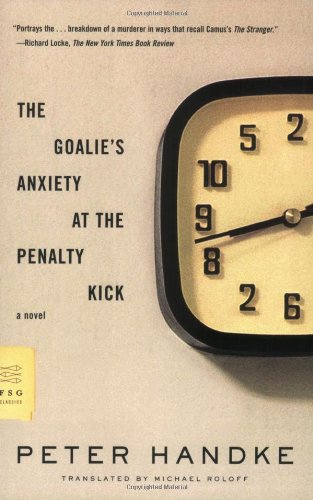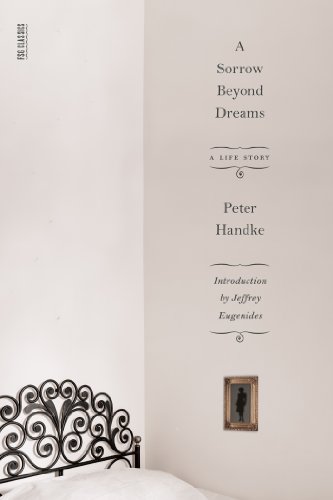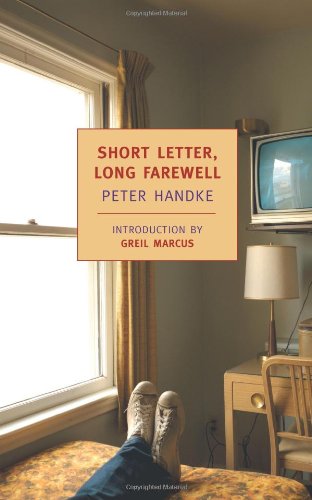Background
Peter Handke was born on December 6, 1942 in Griffen, Austria.



( The first of Peter Handke's novels to be published in E...)
The first of Peter Handke's novels to be published in English, The Goalie's Anxiety at the Penalty Kick is a true modern classic that "portrays the breakdown of a murderer in ways that recall Camus's The Stranger" (Richard Locke, The New York Times). The self-destruction of a soccer goalie turned construction worker who wanders aimlessly around a stifling Austrian border town after pursuing and then murdering, almost unthinkingly, a female movie cashier is mirrored by his use of direct, sometimes fractured prose that conveys "at its best a seamless blend of lyricism and horror seen in the runes of a disintegrating world" (Bill Marx, Boston Sunday Globe).
http://www.amazon.com/gp/product/0374531064/?tag=2022091-20

( "The Sunday edition of the Kärntner Volkszeitung carrie...)
"The Sunday edition of the Kärntner Volkszeitung carried the following item under Local News': In the village of A. (G. township), a housewife, aged 51, committed suicide on Friday night by taking an overdose of sleeping pills.'" So opens A Sorrow Beyond Dreams, the eminent Austrian novelist and playwright Peter Handke's reckoning with his mother's life?which spanned the rise of the Nazis, World War II, and postwar suffering?and death. Both stark and lyrical, full of love, anger, admiration, and a keen sense of history, this slim book reveals Handke at his most lucid and direct. It is the most moving and accessible work in his distinguished career; it is "indispensable" (Bill Marx, The Boston Globe).
http://www.amazon.com/gp/product/0374533644/?tag=2022091-20

(Short Letter, Long Farewell is one the most inventive and...)
Short Letter, Long Farewell is one the most inventive and exhilarating of the great Peter Handkes novels. Full of seedy noir atmospherics and boasting an air of generalized delirium, the book starts by introducing us to a nameless young German who has just arrived in America, where he hopes to get over the collapse of his marriage. No sooner has he arrived, however, than he discovers that his ex-wife is pursuing him. He flees, she follows, and soon the couple is running circles around each other across the length of Americafrom Philadelphia to St. Louis to the Arizona desert, and from Portland, Oregon, to L.A. Is it love or vengeance that they want from each other? Everythings spectacularly unclear in a book that is travelogue, suspense story, domestic comedy, and Western showdown, with a totally unexpected Hollywood twist at the end. Above all, Short Letter, Long Farewell is a love letter to America, its landscapes and popular culture, the invitation and the threat of its newness and wildness and emptiness, with the promise of a new lifeor the corpse of an old onelying just around the corner.
http://www.amazon.com/gp/product/1590173066/?tag=2022091-20
director novelist playwright poet
Peter Handke was born on December 6, 1942 in Griffen, Austria.
Peter Handke entered a Jesuit seminary while still in his teens and stayed there until 1961, when he decided to study law at the University of Graz.
Nevertheless, although Handke began writing highly structured, short prose pieces while still in law school for a little literary magazine called Manuskripte, it wasn't until he left the university in 1965 that he actively began writing.
Peter Handke came to public notice as an anticonventional playwright with his first important drama, Publikumsbeschimpfung (1966; Offending the Audience), in which four actors analyze the nature of theatre for an hour and then alternately insult the audience and praise its “performance, ” a strategy that arouses varied reactions from the crowd. Several more plays lacking conventional plot, dialogue, and characters followed, but Handke’s other most significant dramatic piece is his first full-length play, Kaspar (1968), which depicts the foundling Kaspar Hauser as a near-speechless innocent destroyed by society’s attempts to impose on him its language and its own rational values. Handke’s other plays include Das Mündel will Vormund sein (1969; “The Ward Wants to Be Guardian”; Eng. trans. My Foot My Tutor) and Der Ritt über den Bodensee (1971; The Ride Across Lake Constance).
Handke’s novels are for the most part ultraobjective deadpan accounts of characters who are in extreme states of mind. His best-known novel, Die Angst des Tormanns beim Elfmeter (1970; The Goalie’s Anxiety at the Penalty Kick), is an imaginative thriller about a former football (soccer) player who commits a pointless murder and then waits for the police to take him into custody. Die linkshändige Frau (1976; The Left-Handed Woman) is a dispassionate description of a young mother coping with the disorientation she feels after she has separated from her husband. Handke’s memoir about his deceased mother, Wunschloses Unglück (1972; “Wishless Un-luck”; Eng. trans. A Sorrow Beyond Dreams), is also an effective work. Langsame Heimkehr (1979; Slow Homecoming) is a three-part story that culminates with a meditation on fatherhood, and In einer dunklen Nacht ging ich aus meinem stillen Haus (1997; On a Dark Night I Left My Silent House) follows the life-changing journey of a man made mute by injury. Der Bildverlust; oder, Durch die Sierra de Gredos (2002; Crossing the Sierra de Gredos) details the pilgrimage and interior life of a woman crossing an Iberian mountain range.
Handke also wrote short stories, essays, radio dramas, and autobiographical works. The dominant theme of his writings is that ordinary language, everyday reality, and their accompanying rational order have a constraining and deadening effect on human beings and are underlain by irrationality, confusion, and even madness.
Handke’s literary fame was overshadowed in 2006 by his politics. The writer’s public support of Slobodan Milošević, the former president of Yugoslavia who died that year while on trial for genocide and war crimes, caused controversy after Handke spoke at his funeral. Handke was subsequently selected to receive that year’s Heinrich Heine Prize, though he refused it before it was to be revoked from him.
( The first of Peter Handke's novels to be published in E...)
( "The Sunday edition of the Kärntner Volkszeitung carrie...)
(Short Letter, Long Farewell is one the most inventive and...)
